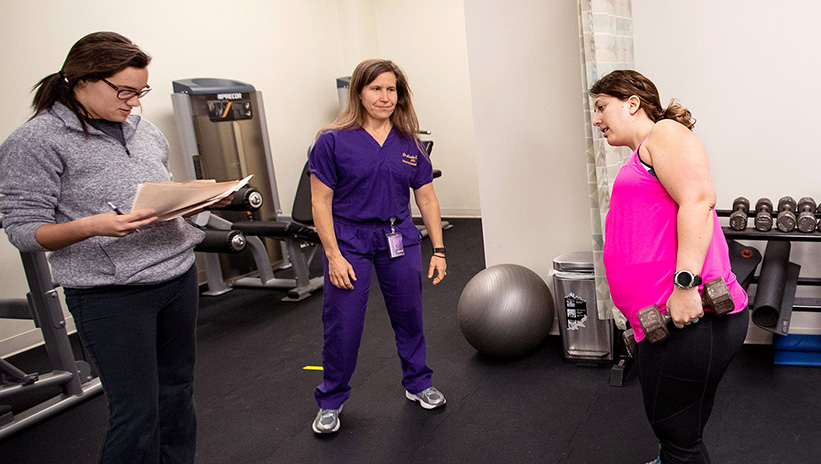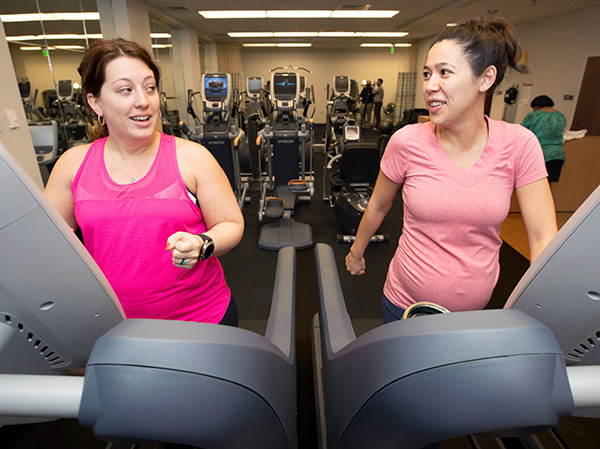In Difficult Times Good People gravitate towards Absolute Truth
Innovative ECU Research Finds Babies Healthier When Moms Exercise During Pregnancy
Publisher's note: The author of this post, Rob Spahr, is a contributor to ECU News Services.

Newborn babies whose mothers exercised during their pregnancy have improved motor skills, heart function and body composition, East Carolina University researchers have found.
Understanding the health benefits of exercise for pregnant women is nothing new. According to the American College of Obstetrics and Gynecology, it can improve the mother's overall health and wellness, ease some common pregnancy discomforts and can even help prepare the body for labor and delivery.
However, Dr. Linda May, an associate professor in the ECU School of Dental Medicine's Department of Foundational Sciences and Research, is the first researcher to study how a mother's exercise affects the child's heart function, neuromotor skills and body composition.
"We know that exercise is beneficial for anybody of any age. Plus, we've seen benefits for the mom and we've seen benefits for the placenta. So it just made sense that the baby's going to have some kind of benefit as well," May said.
The initial findings of May's research, which received a $200,000 grant in 2018 through the American Heart Association's Innovative Project Award, found that 1-month-old babies whose mothers exercised regularly during pregnancy had more advanced motor skills than other babies.
While those important findings have already gained coverage from national media outlets, including Good Morning America and The New York Times, they only tell part of the story.
May's ongoing research is also showing that babies whose mothers regularly exercised during pregnancy also have improved heart function and leaner body composition. The amount of the mother's exercise and her lipid levels can also determine the baby's birth weight, May said.
"So far, all of our research has shown it's a dose response," May added. "If a mom does a little bit of exercise, then her and baby will have a little bit of a benefit. And if she does more, then her and baby will have more of a benefit."

"There is a growing body of research showing that birth weight is associated with not only risk factors, but also cardiovascular disease and death later on," May said. "It's basically a trajectory. At the point of birth, someone is already pointed in the direction of disease or health. You can make changes later on, but that's why it's so critical that we do the intervention during pregnancy - to point the baby in the direction of health rather than disease."
While May's team is still in the process of researching whether certain types of exercise are more beneficial to the health of babies than others - those findings are expected next year - she said the recommended guidelines are 150 minutes of moderate intensity exercise (across three to five days per week) every week.
Women should always get clearance from their OB/GYN provider before beginning or continuing any type of exercise training while pregnant, May said, in the event there are potential health conditions that need to be considered.
May plans to expand her research to include a broader range of women from all BMI ranges, especially those who have no previous exercise experience. She also hopes to secure grant funding that would enable her to track the babies for longer, at least until 5 years of age.
"We've done 1-month measures, but we want to show that babies are healthier all the way up until they enter school," she said. "In my mind, if there are no contraindications, then we should be prescribing exercise for every pregnant woman. To have a healthier pregnancy and a healthier baby, you just need a good pair of shoes."
Go Back

Stephanie Morales, left, and Dr. Linda May work with Jodie Messimer, center, and Lei Grigg during a prenatal exercise class at the East Carolina Heart Institute. | Photos: Rhett Butler | Video: Rich Klindworth
Newborn babies whose mothers exercised during their pregnancy have improved motor skills, heart function and body composition, East Carolina University researchers have found.
However, Dr. Linda May, an associate professor in the ECU School of Dental Medicine's Department of Foundational Sciences and Research, is the first researcher to study how a mother's exercise affects the child's heart function, neuromotor skills and body composition.
"We know that exercise is beneficial for anybody of any age. Plus, we've seen benefits for the mom and we've seen benefits for the placenta. So it just made sense that the baby's going to have some kind of benefit as well," May said.
The initial findings of May's research, which received a $200,000 grant in 2018 through the American Heart Association's Innovative Project Award, found that 1-month-old babies whose mothers exercised regularly during pregnancy had more advanced motor skills than other babies.
While those important findings have already gained coverage from national media outlets, including Good Morning America and The New York Times, they only tell part of the story.
May's ongoing research is also showing that babies whose mothers regularly exercised during pregnancy also have improved heart function and leaner body composition. The amount of the mother's exercise and her lipid levels can also determine the baby's birth weight, May said.
"So far, all of our research has shown it's a dose response," May added. "If a mom does a little bit of exercise, then her and baby will have a little bit of a benefit. And if she does more, then her and baby will have more of a benefit."

Jodie Messimer, left, and Lei Grigg warm up on a pair of treadmills before lifting weights during a prenatal exercise class.
"There is a growing body of research showing that birth weight is associated with not only risk factors, but also cardiovascular disease and death later on," May said. "It's basically a trajectory. At the point of birth, someone is already pointed in the direction of disease or health. You can make changes later on, but that's why it's so critical that we do the intervention during pregnancy - to point the baby in the direction of health rather than disease."
While May's team is still in the process of researching whether certain types of exercise are more beneficial to the health of babies than others - those findings are expected next year - she said the recommended guidelines are 150 minutes of moderate intensity exercise (across three to five days per week) every week.
Women should always get clearance from their OB/GYN provider before beginning or continuing any type of exercise training while pregnant, May said, in the event there are potential health conditions that need to be considered.
May plans to expand her research to include a broader range of women from all BMI ranges, especially those who have no previous exercise experience. She also hopes to secure grant funding that would enable her to track the babies for longer, at least until 5 years of age.
"We've done 1-month measures, but we want to show that babies are healthier all the way up until they enter school," she said. "In my mind, if there are no contraindications, then we should be prescribing exercise for every pregnant woman. To have a healthier pregnancy and a healthier baby, you just need a good pair of shoes."
Latest Neighboring Counties
|
Republicans Bokhari and Driggs retain seats on city council.
Published: Tuesday, March 26th, 2024 @ 12:50 am
By: Carolina Journal
|
|
Members of the North Carolina Rural Health Association (NCRHA) visited Washington, D.C., on Feb. 14, 2024, to meet with elected officials and advocate for policies to improve access to care in rural areas.
Published: Wednesday, February 28th, 2024 @ 12:51 am
By: Eastern NC NOW Staff
|
|
The US Supreme Court will not take the case of Virginia-based owners of a Dare County beach home who challenged the county's COVID-related shutdown in 2020.
Published: Tuesday, February 6th, 2024 @ 10:14 pm
By: Carolina Journal
|
|
The North Carolina State Fair is set for the Raleigh state fairgrounds from October 12-22, 2023
Published: Friday, February 2nd, 2024 @ 9:01 am
By: Carolina Journal
|
|
A $2.5-billion-dollar bond referendum is slated to be placed on the November ballot this year, as Charlotte-Mecklenburg Schools (CMS) looks for support to fund 30 different projects in the school district.
Published: Sunday, January 14th, 2024 @ 10:08 am
By: Carolina Journal
|
|
Five Asheville-area residents are suing the city in federal court for refusing to appoint them to the local Human Relations Commission. The residents claim they were rejected because they are white.
Published: Saturday, December 9th, 2023 @ 11:53 am
By: Carolina Journal
|
|
Federal grant expands midwifery care for North Carolina
Published: Wednesday, November 29th, 2023 @ 2:59 pm
By: ECU News Services
|
|
Pirates achieve historic sponsored activities funding
Published: Tuesday, November 28th, 2023 @ 10:03 am
By: ECU News Services
|
|
Innovative new MBA pathway provides leadership experiences for students, companies
Published: Saturday, November 18th, 2023 @ 10:42 am
By: ECU News Services
|






















